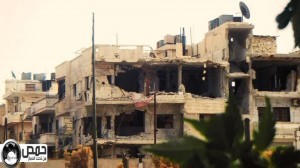Kidnap and Robbery Take Sectarian Turn in Homs

Alia Ahmed
Just from walking around Homs, you can tell that the city is disunited. This is where the civil war broke out, even if people deny it is happening.
After more than a year of fighting, the city is now divided into two segregated camps. There are areas exclusively occupied by Sunnis, and others for Alawites, which are also home to other minority groups like Christians, Druze, Ismailis and Murshidiyyin.

People who used to live in neighbourhoods where the majority belonged to a different faith group from their own have left their homes, either because they suffered harassment and attack, worsening with the outbreak of hostilities, or simply because they heard rumours of trouble.
Hassan al-Ahmed, 61, is a retired public servant now living in the Alawite-majority Al-Nozha quarter of Homs.
“I lived for 25 years in the Fadaous quarter, which has a Sunni majority, and no one ever gave me any trouble,” said Ahmed, who is Alawite. “We were like family, but after things escalated in Homs and the government started arresting people, we started waking up to the sound of gunshots being fired at our house. We were threatened and told to leave.
“Our house was looted and turned into a passageway for gunmen. After government troops entered the neighbourhood and drove the insurgents out, they discovered holes in the walls that the militia members had used to move safely from house to house.”
Many Sunnis in Homs say their relatives were kidnapped and killed by the security forces and the pro-government militias known as shabbiha. This forced them to flee from their neighbourhoods, sometimes even from the city. But similar tragedies have also befallen civilians who back the government, most of whom are Alawites.
Salma Mohammed, an Alawite who lives in the city’s Al-Sabil neighbourhood, described how her cousin was murdered.
“My cousin was barely 17, and he used to commute to Tartous to work in the construction industry,” she said. “He was kidnapped three months ago. They contacted us and demanded ten million Syrian pounds [143,000 US dollars] for his release. They refused my uncle’s requests to release him in return for the one million pounds that his neighbours and relatives were able to contribute. After that call, the kidnappers stopped phoning the family. His mother died of a stroke brought on by grief. It was probably better for her – her son’s body was found just a month ago, dumped by the side of the road to Hama.”
Mona al-Hindawi, a mother of five who lives in Homs’s Al-Muhajirin quarter, lost her husband, a traffic policeman.
“He was in Al-Qussur district in November last year when a funeral procession passed by. One of the participants identified him as an Alawite and incited others to attack him…. His body was found at the Al-Nasr tomb site later the same day,” Hindawi said.
“I am not the only one who’s experienced a tragedy like this. Our neighbour, a retired army officer, was killed along with his son and nephew in Al-Khalidiyyah last year…. We face such catastrophes every day. It’s as if people have turned into monsters.”
In addition to kidnapping and murder, robbery is now widespread in Homs because of the lack of security.
Salem, a young Sunni from the Deir Baalaba district of Homs, described how he got involved in crime.
“Some of my friends and I agreed to go robbing abandoned houses. We were manual labourers but we weren’t able to get work any more,” he said. “I was arrested seven months ago. There were Alawite thieves in prison along with me. I was later released, and I moved to Damascus, where someone helped me find a job – I’ve got children.”
Salem says the worsening economic climate is the main factor that pushed him into committing robberies.
Others, however, justify such acts as a way of getting revenge. Many Alawites in Homs have no sympathy with the Sunnis in Al-Khaldiyah, Baba Amr and Al-Qussur quarters, which have been devastated by fighting. They say Sunnis have kidnapped and killed their children.
Abdo al-Sayyed is among them – an Alawite, his brother was killed, and the taxi which provided an income for the whole family was set on fire.
“We have the right to rob these criminals’ homes,” he said. “They have robbed us of our security and taken our money. The Gulf states paid for their houses, but they have abandoned them. Now we have a right to rob these houses in order to survive.”
Not all Alawites in Homs share the view that crime can be justified.
“What is happening is a terrible crime and totally unacceptable. People who left their homes during the conflict did nothing wrong,” Um Maysam, an Alawite woman in the Akramah district, said. “I don’t believe all Sunnis are criminals. My son-in-law is Sunni, and his family are kind and no different from us.
“Why did people forget their old friendships? It’s a disaster for the whole country. Nothing can justify theft, even an extreme need for money. Some people steal when they aren’t even in need – they’re just greedy. I’m not willing to buy anything that’s been stolen from other people’s homes.”
